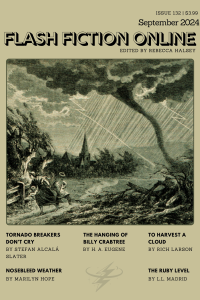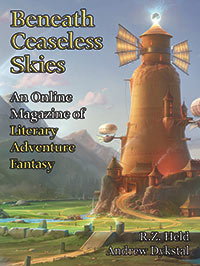Paul Di Filippo Reviews Sing Your Sadness Deep by Laura Mauro
 Sing Your Sadness Deep, Laura Mauro (Undertow 978-1988964133, $27.99, 236pp, hardcover) August 2019
Sing Your Sadness Deep, Laura Mauro (Undertow 978-1988964133, $27.99, 236pp, hardcover) August 2019
This year marks the tenth anniversary of the founding of Undertow Publications, under the aegis of Michael Kelly, who wears a second hat as an accomplished fiction writer himself, thus continuing the field’s grand tradition of editors who know how stories are put together from the inside out (Knight, Dozois, Campbell, et. al). During that span Undertow has issued close to thirty books, all of them extremely high quality and exhibiting refreshingly uncommon themes and visions.
Laura Mauro’s first sale, according to ISFDB, occurred in 2012 in one of Undertow’s anthologies, and since then she has accumulated enough short fiction to encompass her debut collection from the firm that launched her. This strikes me as the kind of thoughtful and beneficial career-fostering that used to be regular practice in the days before the Big Five conglomerates, and it speaks again to the important role of the independent presses in our field.
Let us depart, with lingering backward glances, from the gorgeous and striking cover by Stephen Mackey, and see what we find inside. Do I detect resonances with such masters of the horrific and weird as Caitlin Kiernan, Darren Speegle, Kathe Koja and Tanith Lee? Indeed, I do! And also affinities with younger standouts such as Kat Howard, Priya Sharma, C.S.E. Cooney, Simon Strantzas, Sarah Pinsker, and Caroline Yoachim, a cohort of desolation angels.
“Sun Dogs” evokes a kind of near-collapse day-after-tomorrow atmosphere, in which our narrator, a woman named Sadie, rescues a hunted woman, June, and takes her into her home. Their love affair survives the revelation of June’s otherworldly nature. “We had no plan, no destination, and perhaps we would fail, but for now we would run…”
In the winter-stark “Obsidian”, two young siblings, Aino and Pihla, must confront the creature that lives in a frozen lake. “Up close, she can see the individual strands of his hair, a glossy thicket of kelp…”
Rina, Alexei, and Sam embark on a mad road trip in “Red Rabbit”, following mystical sigils across the country. “The ears are sickles…eyes are empty white holes…” But not everyone will reach the end of the journey alive.
In a compact intense burst, “Letters from Elodie” conveys the nature of an alluringly damaged woman named Elodie, and the fatal attraction she has on the narrator. “She smelled like cigarettes and sweat and rum. Her lips were silk against my ear.”
The English countryside becalmed in a mysterious fog. Apparitions appear in the sky, speechless figures. They become a media sensation, but for one man, Adam, their call is more personal and compelling. Thus, “The Grey Men”. “Outside, the streets were awash with a thick, milky silt.”
“Abnormal pregnancies” is a potent trope used by everyone from Ray Bradbury onward, and Mauro honors the motif with “Ptichka”. Making the mother an immigrant in an unwelcoming land heightens the estrangement and unreality, but Marta proves heroic in her maternal loyalties. “The bird is a small black shape just visible beneath the frost-rimed leaves. Not even the foxes have touched it.”
There’s a Miéville/Gaiman vibe to “When Charlie Sleeps”, as we learn about the ancient secret monster underpinning London’s psychic and physical malaise. It’s up to a group of squatters to deal with the creature—but are they ready and capable? “The next day a swarm of beetles pour from the rotten space inside the walls…”
One of two stories original to this collection, “In the City of Bones” begs for some Mike Mignola illustrations. Zoya, an orphaned mutant, lives a strange life in an abandoned Russian town, obeying the orders of folks who are not precisely friends nor keepers. But left alone, she conjures up alternate pathways to other realms. “They are the only person since the orphanage who has touched my skin, who has seen the full extent of my disfigurement…”
In “The Looking Glass Girl”, the hot sunlight of Sicily hides the cold secrets of an old death, and the narrator cannot rest until she uncovers the truth of her sister’s passing. “Word travels in a small town. Strange stories emerge from the chrysalis of an ill-kept secret.”
You might imagine you have read all the variations on the conceit of fey changelings, but “In the Marrow” will provide you with surprises and novelties along those lines. “After a while it hurt to look at Mam and Dad. The too-gentle way they’d smile at her. The way they’d feed her little questions…”
Perhaps the centerpiece of the volume, the longest tale, is “Looking for Laika”. Here, Mauro beautifully blends childhood fantasies, the famous Russian space dog, and the threat of nuclear annihilation into something resembling a spectral version of the graphic novel by the Tamikis, This One Summer. “There is an unbearable pressure at his core, and his entire body is tight as a drumskin…”
In “Strange as Angels”, Frankie and Jimmy’s relationship is extremely dysfunctional and it is certainly not helped by the discovery and adoption of an odd hand-sized alien creature—who grows into a predatory thing. But one partner is better adapted to survive than the other. “The sirens are loud in Frankie’s ears as she climbs onto the counter, trailing wet red shoeprints.”
Finally, the second heretofore-unseen piece: “The Pain-Eater’s Daughter”. A clever variation on the notion of “sin eaters,” the tale charts the slow maturation of the titular character who must decide how she will inherit the self-destructive but valuable family legacy of service. “‘All gifts come with a cost,’ her grandad says. ‘No matter how careful you are, the pain will find its way inside you.'”
With its well-honed prose, this collection shows us a writer who is focused intimately on the seams in a naturalistic present through which otherworldly pains—and a few pleasures—leak. With her concentration on familial ties; the bonds between lovers; and the often irrational taboos of tribalism, Mauro declaims that the human heart in conjunction with an unknowable universe breeds terror and wonder.
Emerging from the crimson bowels of this dark volume, one might expect to feel battered and downcast. But the effect is precisely the opposite. Although many of her characters go down to defeat, others pass through the fire and emerge stronger. Even the ones who fail go down swinging, and with a lack of self-deceit about what they really are. Those are victory conditions in Mauro’s cosmic scheme of life.
 While you are here, please take a moment to support Locus with a one-time or recurring donation. We rely on reader donations to keep the magazine and site going, and would like to keep the site paywall free, but WE NEED YOUR FINANCIAL SUPPORT to continue quality coverage of the science fiction and fantasy field.
While you are here, please take a moment to support Locus with a one-time or recurring donation. We rely on reader donations to keep the magazine and site going, and would like to keep the site paywall free, but WE NEED YOUR FINANCIAL SUPPORT to continue quality coverage of the science fiction and fantasy field.







